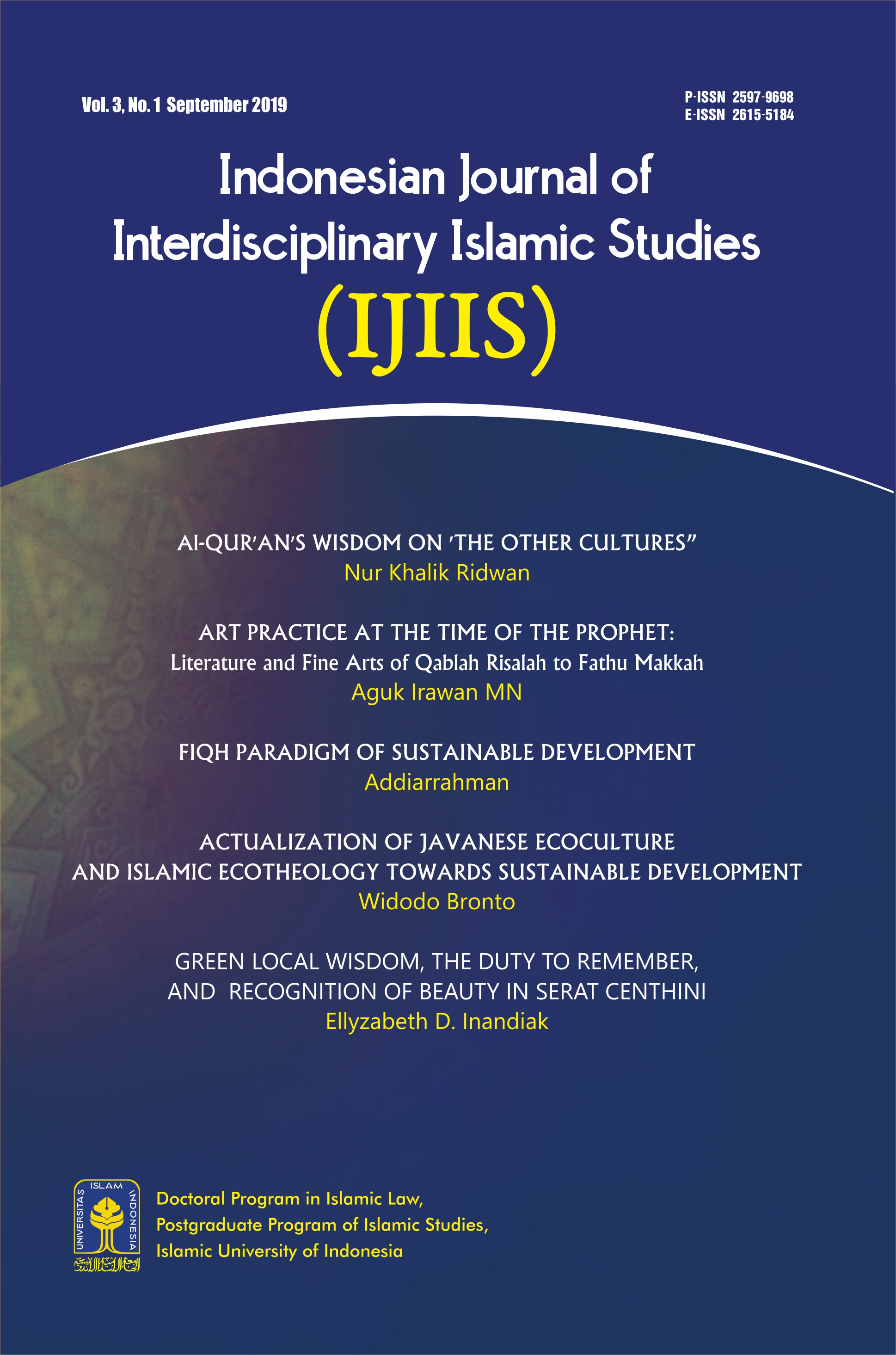Main Article Content
Abstract
In line with development dynamics, environmental degradation continues and threatens development sustainability. The concept of sustainable development with economic, social, and environmental pillars requires actualization across aspects. Amongst the important aspects are culture and religion which is fundamentally inherent in every human being to drive behavior. The values of longstanding Javanese culture emphasize environmental conservation teachings, including Hamemayu Hayuning Bawono, Hamengku Buwono philosophy, Satriya attitude, and the forecasts saying kali ilang kedunge, pasar ilang kumandange, wong wadon ilang wirange, and wong lanang ilang kawibawane. Ecoculture actualization requires several strategies. First, the government policy should further consider environmental dynamics. Second, earth-related and environmental education should be intensified formally, informally, and non-formally. Third, the society should be informed and invited to actualize local wisdoms. Islamic values should be further optimized as a fundamental strategy in environmental conservation. Islam views nature as Allah’s blessing, and the logical consequence is being grateful by continuously preserving it. Several important measures can promote ecological piety. First, Islamic education curriculum in boarding schools, madrasahs, Islamic forums, and formal schools should reinforce environmental theology and its applications. Second, religious organizations should facilitate intensive communication among stakeholders. Third, commitment is proven through tangible actions.
Keywords
Article Details

This work is licensed under a Creative Commons Attribution-ShareAlike 4.0 International License.
References
- Al-Qardhawi, Yusuf. 2002. Islam Agama Ramah Lingkungan (Islam as Environmental Friendly Religion). Jakarta: Pustaka Al-Kautsar.
- Baiquni, M, dan Susilowardani. 2002. Pembangunan yang Tidak Berkelanjutan: Refleksi Kritis Pembangunan Indonesia (Non Sustainable Development: Critical Review of Indonesia Development). Yogyakarta: Transmedia Global Wacana.
- Brundtland. 1987. Report of the World Commission on Environment and Development: Our Common Future. UN
- Giddens, Anthony. 2001. The Third Way: Jalan Ketiga Pembaruan Demokrasi Sosial (the Third Renewing Social Democracy). Jakarta: PT. Gramedia Pustaka Utama
- Hardjosoemantri, Koesnadi. 2006. Hukum Lingkungan (Environmental Law). Yogyakarta: Gadjah Mada University Press
- Hoff, E. 2005. Language Development. CA: Wadsworth.
- Keraf, Sony. 2006. Etika Lingkungan (Environmental Ethics). Jakarta: Penerbit KOMPAS
- Koentjaraningrat. 1985. Pengantar Ilmu Antropologi (Introduction to Anthropology). Jakarta: Aksara Baru.
- McMullin dan Nielsen, L.A. 1991. Resolution of Natural Resource Allocation Conflict Through Effective Public Involvement. Policy Studies Journal 19 (3 – 4): 553-9.
- Mitchell, Bruce, 2003. Pengelolaan Sumberdaya Alam dan Lingkungan (Natural Resources and Environmental Management). Yogyakarta: Gadjah Mada University Press.
- Nababan (1995). Kearifan Tradisional Dan Pelestarian Lingkungan Di Indonesia (Local Wisdom and Environmental Conservation). Jurnal Analisis CSIS : Kebudayaan, Kearifan Tradisional dan Pelestarian Lingkungan Tahun XXIV No. 6 Tahun 1995.
- Poerwanto, Hari. 2000 Kebudayaan dan Lingkungan dalam Perspektif Antropologi (Culture and Environment: Anthropology Perspective). Yogyakarta: Pustaka Pelajar.
- Sairin, Sjafri. 2009. Perubahan Sosial Masyarakat Indonesia ”Perspektif Antropologi” (Social Change of Indonesian Community: Anthropology Perspective). Yogyakarta: Pustaka Pelajar.
- Soemarwoto, Otto. 2001. Ekologi, Lingkungan Hidup, dan Pembangunan (Ecology, Environment and Development). Jakarta: Penerbit Djambatan.
- Soerjani, M. 1986. Pemahaman Konsep Lingkungan Perkotaan (Understanding to Urban Ecosystem). Jakarta : PPSML UI.
- Spradley, J.P. 1972. Foundations Of Cultural Knowledge. San Fransisco: Chandler
- Suhartini. 2009. Kajian Kearifan Lokal Masyarakat Dalam Pengelolaan Sumberdaya Alam dan Lingkungan (Local Wisdom for Natural Resources and Environmental Management). Prosiding Seminar Nasional Penelitian, Pendidikan dan Penerapan MIPA, Fakultas MIPA, Universitas Negeri Yogyakarta, 16 Mei 2009.
- Suritohardoyo. 2012. Pengelolaan Lingkungan Sosial (Social Environmental Management). Yogyakarta: Fakultas Geografi UGM.
- Tasdiyanto. 2010. Budaya Lingkungan Akar Masalah dan Solusi Krisis Lingkungan (Environmental Culture: Key Problem and Solution of Environmental Crisis). Yogyakarta: Ecologia Press.
- Yuwono. 2005. Pelestarian Warisan Budaya Jawa dan Lingkungan Hidup Untuk Mendukung Industri Pariwisata di DIY (Javanese Cultural Heritage Conservation for Supporting Yogyakarta Tourism), makalah Simposium Lingkungan Hidup dan Pariwisata BAPEDALDA DIY-Kyoto Prefecture, Yogyakarta 18-19 Juli 2005.
References
Al-Qardhawi, Yusuf. 2002. Islam Agama Ramah Lingkungan (Islam as Environmental Friendly Religion). Jakarta: Pustaka Al-Kautsar.
Baiquni, M, dan Susilowardani. 2002. Pembangunan yang Tidak Berkelanjutan: Refleksi Kritis Pembangunan Indonesia (Non Sustainable Development: Critical Review of Indonesia Development). Yogyakarta: Transmedia Global Wacana.
Brundtland. 1987. Report of the World Commission on Environment and Development: Our Common Future. UN
Giddens, Anthony. 2001. The Third Way: Jalan Ketiga Pembaruan Demokrasi Sosial (the Third Renewing Social Democracy). Jakarta: PT. Gramedia Pustaka Utama
Hardjosoemantri, Koesnadi. 2006. Hukum Lingkungan (Environmental Law). Yogyakarta: Gadjah Mada University Press
Hoff, E. 2005. Language Development. CA: Wadsworth.
Keraf, Sony. 2006. Etika Lingkungan (Environmental Ethics). Jakarta: Penerbit KOMPAS
Koentjaraningrat. 1985. Pengantar Ilmu Antropologi (Introduction to Anthropology). Jakarta: Aksara Baru.
McMullin dan Nielsen, L.A. 1991. Resolution of Natural Resource Allocation Conflict Through Effective Public Involvement. Policy Studies Journal 19 (3 – 4): 553-9.
Mitchell, Bruce, 2003. Pengelolaan Sumberdaya Alam dan Lingkungan (Natural Resources and Environmental Management). Yogyakarta: Gadjah Mada University Press.
Nababan (1995). Kearifan Tradisional Dan Pelestarian Lingkungan Di Indonesia (Local Wisdom and Environmental Conservation). Jurnal Analisis CSIS : Kebudayaan, Kearifan Tradisional dan Pelestarian Lingkungan Tahun XXIV No. 6 Tahun 1995.
Poerwanto, Hari. 2000 Kebudayaan dan Lingkungan dalam Perspektif Antropologi (Culture and Environment: Anthropology Perspective). Yogyakarta: Pustaka Pelajar.
Sairin, Sjafri. 2009. Perubahan Sosial Masyarakat Indonesia ”Perspektif Antropologi” (Social Change of Indonesian Community: Anthropology Perspective). Yogyakarta: Pustaka Pelajar.
Soemarwoto, Otto. 2001. Ekologi, Lingkungan Hidup, dan Pembangunan (Ecology, Environment and Development). Jakarta: Penerbit Djambatan.
Soerjani, M. 1986. Pemahaman Konsep Lingkungan Perkotaan (Understanding to Urban Ecosystem). Jakarta : PPSML UI.
Spradley, J.P. 1972. Foundations Of Cultural Knowledge. San Fransisco: Chandler
Suhartini. 2009. Kajian Kearifan Lokal Masyarakat Dalam Pengelolaan Sumberdaya Alam dan Lingkungan (Local Wisdom for Natural Resources and Environmental Management). Prosiding Seminar Nasional Penelitian, Pendidikan dan Penerapan MIPA, Fakultas MIPA, Universitas Negeri Yogyakarta, 16 Mei 2009.
Suritohardoyo. 2012. Pengelolaan Lingkungan Sosial (Social Environmental Management). Yogyakarta: Fakultas Geografi UGM.
Tasdiyanto. 2010. Budaya Lingkungan Akar Masalah dan Solusi Krisis Lingkungan (Environmental Culture: Key Problem and Solution of Environmental Crisis). Yogyakarta: Ecologia Press.
Yuwono. 2005. Pelestarian Warisan Budaya Jawa dan Lingkungan Hidup Untuk Mendukung Industri Pariwisata di DIY (Javanese Cultural Heritage Conservation for Supporting Yogyakarta Tourism), makalah Simposium Lingkungan Hidup dan Pariwisata BAPEDALDA DIY-Kyoto Prefecture, Yogyakarta 18-19 Juli 2005.
